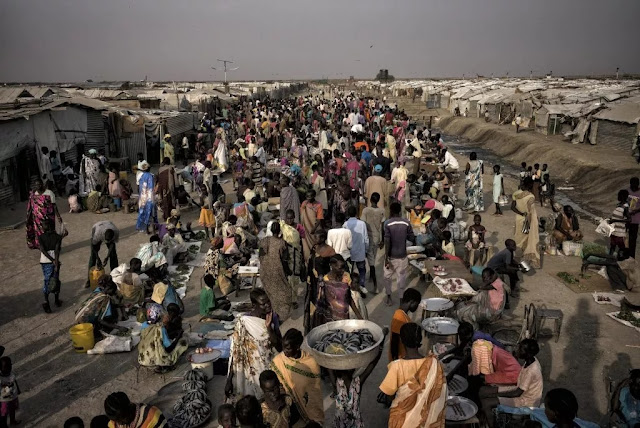Map of South Sudan - Kodok is in the
northeastern corner of the country
northeastern corner of the country
I have selected as one of my case studies the life and ministry of Rev. Johnson Amum. Johnson is the son of Ayik who served as the singer/poet for six Chollo Reths (kings). Ayik groomed his son Amum to take his place as singer/poet for the king, but sickness took sixteen-year-old Amum to the town of Malakal where his life would be forever changed through his encounter with the church and the person of Jesus Christ. While Amum inherited the natural gift of song composition and song presentation from his father, he was encouraged by his pastor from those early years as a young Christian to use this natural gift and translate it into use for the church, to bring praise, honor, and glory not to the Chollo king but to the Lord Jesus Christ, the King of kings. In Kodok, we spent time with local church leaders, church members, and respected community members who shared about the life and ministry of Rev. Johnson Amum. It was a significant journey.
What came as a surprise during this trip was how my eyes were opened. After five years of being sequestered in Juba and only hearing stories about displacement and suffering caused by war, I now stood in locations previously described to me by students who fled the fighting in 2014. Rev. Johnson described the ongoing trauma experienced by his daughter due to the crisis and war. When I asked him if he also was traumatized, he affirmed what we have commonly heard, “Yes, all of us in South Sudan are traumatized.” As I think about contextual theology, one cannot avoid the context of South Sudan, a land broken and devastated time and again by war.
On our way back to Juba, we stayed in the major port city of Malakal at the “Hub,” a maze of offices and an alphabet soup of non-governmental organizations (NGOs) working in the region, serving the humanitarian interests of the people. At the Hub, it felt like everyone was walking a bit faster; an air of importance and urgency permeated the place. Replete throughout was a sense of timeliness, order, speed, technological sophistication, accountability, and other highly prized values of western donors and aid agencies. In contrast to the Hub and its calculated efficiency was the large population inside the massive United Nations “protection of civilians” site (POC). Inside, protected by barriers and armed UN personnel carriers, the POC felt like a very large African village/town, suffused with life in all its strengths, weaknesses, and inherent glory. Children were playing everywhere, shopkeepers were relaxing after a long day, women were cooking local dishes in small restaurants, and almost everyone gawked at the strange “kawaja” (white westerner) walking with his South Sudanese friend to buy dried fish at the market within the POC.
Being in the POC in Malakal reminded me that no matter how squeezed and pushed down a people are by deplorable circumstances related to the devastation of war and displacement, the reality of life and the hope of life will inevitably reveal itself. Lord of life, may the hope of life, the hope for a better life, and the hope for eternal life be the song which keeps our hearts light and our feet moving, one step at a time. In your mercy, hear the cries of your children.

.jpg)
%20.jpg)
%20.jpg)



.jpg)
2 comments:
Thanks for this update Bob. You and Kristi are spreading hope to many people as you learn and share God‘s Word. Praise God!
WOW!
Post a Comment